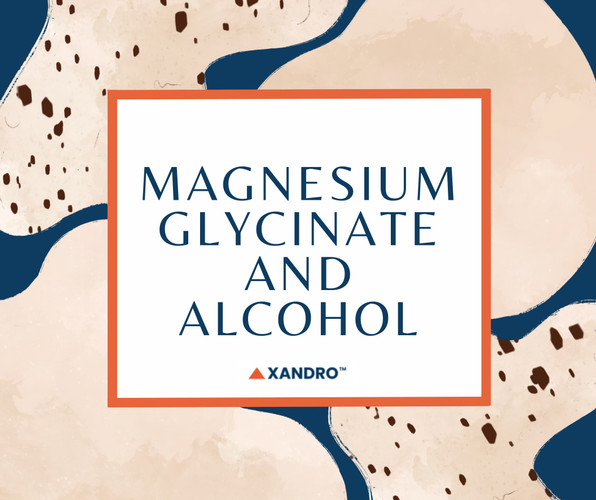Benefits of Magnesium Glycinate in Relation to Alcohol Consumption
22nd Nov 2023
Magnesium Glycinate and Alcohol
We all know that excessive consumption of alcohol is bad for our bodies, but what does it do to our magnesium levels specifically, and is there a way to prevent this?
Most importantly, can I take magnesium after drinking alcohol?
How Does Alcohol Affect Our Magnesium Levels?
Drinking alcohol depletes our bodies of a range of vitamins and minerals, including magnesium.
There is a link between magnesium deficiency and alcohol consumption for many reasons. It causes our bodies to quickly release magnesium by the kidneys through our urine, along with other electrolytes, which especially affects alcoholics as their body becomes depleted of their magnesium stores.
Drinking excessive alcohol can also cause vitamin D deficiency and cause our digestive system to not work properly, which both contribute to low magnesium levels.
It’s not just these reasons that cause magnesium deficiency, though, it’s also a range of other alcohol-related factors, including a poor diet and loss through vomiting and diarrhoea.
Interestingly, studies have found that low magnesium levels may also be a reason for alcoholism manifesting, meaning magnesium may be a preventative measure to forestall or reduce the harmful effects of long-term alcohol use, or even prevent cancer from forming.
Can I take Magnesium After Drinking Alcohol?
Magnesium has been found to protect our liver and its function and potentially lower the risk of death from alcohol-related liver disease.
Taking magnesium glycinate after drinking alcohol can actually help your body slow alcohol absorption. It won’t cure your hangover, but it can aid your body in detoxifying the alcohol through the glycine, producing the antioxidant, glutathione. In animal tests, glycine has also been shown to prevent alcohol-induced stomach lesions, such as ulcers.
It might help to have an electrolyte drink containing magnesium after a night of drinking to help replenish your minerals and potentially help your hangover. Taking magnesium for alcohol withdrawal is needed to replenish the loss of the mineral caused by alcoholism.
When taking magnesium, don’t take it with alcohol, take it afterward with a full glass of water to reduce side effects. Remember, alcohol absorbs the water in your gut, making you dehydrated, but so does magnesium, which can wreck havoc in your stomach.
Drinking alcohol with magnesium glycinate or mixing magnesium and alcohol can cause:
- Sluggishness
- Drowsiness
- Dizziness
- Shortness of breath
- Hives
- Itching
- Cardiac arrest
- Seizures
- Death
Make sure you also take the right magnesium, too. Never take magnesium citrate, or other magnesium laxatives with alcohol, as they can cause diarrhoea, stomach pain, nausea and bloating. Taking a highly bioavailable form of magnesium is essential after alcohol to increase your magnesium levels, which is why we like to talk about magnesium glycinate. It’s one the best magnesium for alcoholics.
Further Reading: The Different Forms of Magnesium
Have any more questions about magnesium glycinate? Read out blog posts full of FAQs about magnesium glycinate here and here.
Alcohol can also interfere with many different medications, like antidepressants, painkillers and birth control, so make sure to double-check with your doctor before mixing the two to avoid adverse effects.
It's important to take care of yourself and understand the impacts on your body when you drink alcohol. If you can’t fix your diet, consider supplementing the vitamins and nutrients with dietary supplements.
Experience the longevity and health benefits of taking one of the best absorbing forms of magnesium today by grabbing your hands on Xandro Lab’s Magnesium Glycinate.
If you think you want to experience the benefits yourself, why not try Xandro Lab’s
Magnesium Glycinate 500mg via our 30-day refund guarantee?
